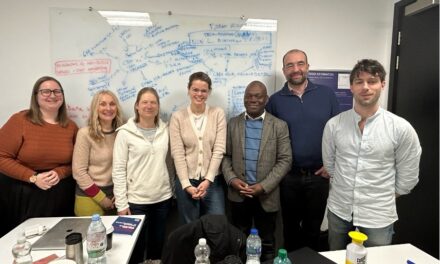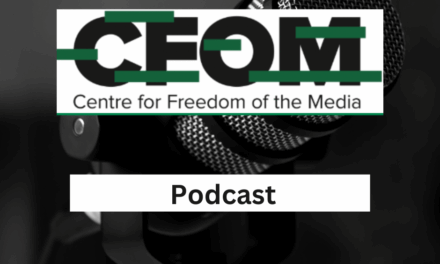 CFOM was recently visited by Zoran Fidanoski, a member of the Agency for Audio and Audiovisual Media Services in Macedonia among other positions. His visit formed part of a six week trip to the UK. The trip was part of ‘FCO Programme for Professional Development for Western Balkans – Leaders for the Future’, during which he aimed to learn from the UK industry how our media is regulated. Fidanoski also had the chance to visit the BBC and OFCOM, where he will have learned some practical skills to take back to his home organisations.
CFOM was recently visited by Zoran Fidanoski, a member of the Agency for Audio and Audiovisual Media Services in Macedonia among other positions. His visit formed part of a six week trip to the UK. The trip was part of ‘FCO Programme for Professional Development for Western Balkans – Leaders for the Future’, during which he aimed to learn from the UK industry how our media is regulated. Fidanoski also had the chance to visit the BBC and OFCOM, where he will have learned some practical skills to take back to his home organisations.
This scheme, which funds several professionals from countries in the Western Balkans, aims to educate key personnel from these states, to help them in their institutional reform and accession to the EU. We hope that this scheme might go some way towards addressing the lack of EU efforts to protect press freedom and their seeming lack of consideration of press freedom when considering new member states.
Read more about the EU’s failure to fully address media freedom here.
Macedonia has one of the lowest media freedom ranking of any European country. At the time of publication it was ranked 117 in the RSF World Press Freedom Index. This freedom ranking has fallen drastically since 2009, when it was only 34th in the world. The largest problems faced by the Macedonian media are the misuse of defamation laws to arrest journalists and the tactical use of state funding to prioritise media with a specific bias. In 2015 the opposition party published reports of illegal wiretapping by the security services of over 100 journalists. Media reform is now one of the top priorities for Macedonia in seeking to become a truly democratic state.
The Agency for Audio and Audiovisual Media Services in Macedonia is the sole regulatory authority in the country, proclaimed to be independent by Macedonia regulatory law. It is a not-for-profit organisation appointed by the Assembly of the Republic of Macedonia with a mandate to control all Macedonian broadcasters and all foreign media organisations who broadcast their programmes on Macedonian cable and IPTV operators. It monitors Macedonian media for the protection of minors and all citizens, and is responsible for licensing broadcasters in the country.
Fidanoski also volunteers for the Association of Journalists of Macedonia. This independent, non-governmental and non-party-political organisation aims to promote free Macedonian media by protecting their rights and fighting against the monopolisation and control of the press. The association aims to provide a working system of self-regulation in order to remove the need for state intervention.
The Association also campaigns for better support from the EU and US in implementing the necessary media reforms. Self-regulation will go a long way towards creating a free and fair media, but it cannot go all the way. Self-regulation would not have stopped the wiretapping scandal, nor can it protect journalists from the powers of private finance to control vast swathes of public media. A cultural shift is needed. Politicians must come to accept criticism in the media and stop misusing defamation laws to prosecute journalists. The EU must step up and make a real effort to protect media freedom within it’s borders. It must develop a stronger approach.
The Association has made a perceivable impact in recent years. The recent Przino Agreement, for which they campaigned, saw the resignation of the prime minister responsible for the wiretapping and the institution of a caretaker government to bring the country up to the June 2016 elections. The agreement also promised media reforms that would promote a true democracy ahead of the election.
However, there remains much more to do. Although the EU has stressed the priority of media reforms they have recently stopped insisting that these reforms come ahead of the June elections. This would mean the next government to come to power might do so with the help of a biased media. The EU’s approach to media freedom remains soft. Their statements may be powerful, but their actions are anything but.
We hope that we at CFOM can share our research with Fidanoski and the organisations he represents, with the common aim of improving media freedom in Macedonia and across Europe. This form of trans-European skills sharing should form a staple part of EU tactics for achieving the level of media freedom it claims to support. Although coupled with removing the pressure for media reform in advance of Macedonia’s elections, it is none the less a strong move in the right direction.




